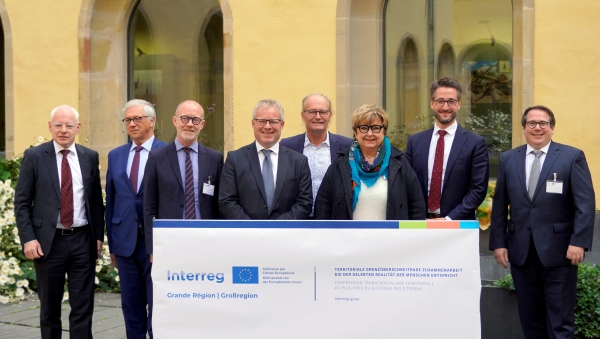 Credit: MEA, DATer
Credit: MEA, DATer
On Monday 10 October 2022, an event organised for the closing of the Interreg V Greater Region 2014-2020 programme and the launch of the Interreg VI Greater Region programme for the period 2021-2027 brought together more than 200 participants from all over the Greater Region to Abbaye Cultural Meeting Centre Néimënster in Luxembourg.
Interreg Greater Region Programme supports cross-border cooperation projects between local and regional actors from the territories that make up the Greater Region, which includes whole of Luxembourg and neighbouring areas from France, Germany and Belgium, together accomodating approximately 11.4 million inhabitants.
Luxembourg's Minister for Spatial Planning, Claude Turmes, President of the Interreg Greater Region Management Authority, Brigitte Torloting, representative of the European Commission, Olivier Baudelet, as well as political representatives of the partner authorities of the programme, amongst others, participated in the event.
The morning was dedicated to a political round table followed by a press conference and in the afternoon, workshops explained to the interested public the concrete conditions governing new projects. Individual meetings with the contact points of the various sides also made it possible to explore the various questions in greater depth. In addition, an exhibition presented posters of projects carried out during the 2014-2020 programming period.
Functional areas to strengthen living together in the Greater Region
“The further we are from the Greater Region, the less we are aware of its importance. We are doing some great projects but we are still too far from the citizens, we have to get closer to them. This is why the concept of functional areas constitutes one of the major innovations of the programme: we will finally have defined territories of cooperation and this approach will make the work much easier and therefore more concrete for the citizens", underlined Minister Turmes during the the political round table which made it possible to draw up a positive assessment of the past 2014-2020 programming period and to discuss the prospects and priorities for the new 2021-2027 programming period. In conclusion, Minister Turmes was delighted that all of the partners present shared the same wish to set up a shared approach which would bring the work carried out by the political authorities closer to the citizens and that it would correspond better to the expectations and needs of their daily life.
There was a consensus among politicians that cross-border cooperation has proven to be indispensable, even essential during the pandemic. "This COVID-19 crisis requires a lot more proximity", noted Ms Torloting. Marc Zingraff, vice-president of the "International Relations" commission, Greater East Region, added: "The pandemic has revealed that we are a real living area”.
Jürgen Barke, Saarland's Minister for Economy, Innovation, Digitalisation and Energy, said: "We have to work even harder to make Europe's regions better perceived at cross-border level and to further reduce the obstacles encountered”. Gilbert Schuh, vice-president of the Department of Moselle in charge of international relations, cross-border issues, multilingualism and the Greater Region, remarked: "There has been progress but we have to get closer to the citizens. We must create and implement a cross-border democracy!”
€182 million to consolidate local cross-border cooperation
Co-financed by the European Regional Development Fund (ERDF), the budget allocated to the Interreg Greater Region program for the new programming period has increased by €42 million to €182 million. Approved by the European Commission, the programme for the new period is built around four thematic axes:
- A greener Greater Region;
- A more social Greater Region;
- A Greater Region closer to citizens;
- Better governance of cross-border cooperation in the Greater Region.
The first call for projects will be launched on 15 November 2022 and interested projects will have until 31 January 2023 to submit their projects.
Further information on Interreg Greater Region Programme is available online via: http://www.interreg-gr.eu.








